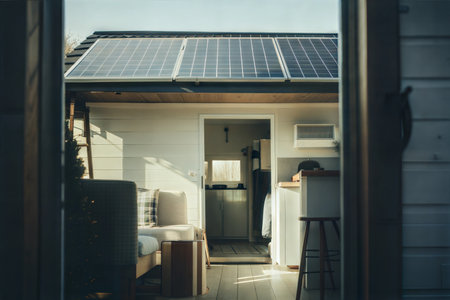Understanding the British Climate and its Impact on Garage Conversions
When considering energy efficiency upgrades for garage conversions, it is vital to first understand the unique characteristics of the British climate. The UK is renowned for its unpredictable weather, marked by frequent rainfall, relatively high humidity, and fluctuating temperatures throughout the year. These conditions pose particular challenges when transforming a standard garage into a comfortable and energy-efficient living space. Unlike purpose-built rooms, garages are often constructed with single-skin walls, minimal insulation, and basic draught-proofing, making them especially vulnerable to heat loss in winter and overheating in summer. As such, homeowners looking to convert their garages must pay close attention to how these typical weather patterns will affect thermal performance. Prioritising robust insulation, moisture control, and ventilation strategies becomes essential not only for comfort but also for long-term savings on energy bills. By understanding the direct impact of the British climate on your conversion project, you can make more informed investment decisions that ensure your new living space is both inviting and cost-effective all year round.
2. Key Energy Efficiency Upgrades for Garage Conversions
Transforming a garage into a comfortable, year-round living space in the UK demands a strategic approach to energy efficiency upgrades. Given the British climate’s unique blend of cold winters and damp conditions, prioritising the right solutions is essential for both comfort and long-term savings.
Insulation: The Foundation of Energy Efficiency
Proper insulation is the cornerstone of any garage conversion. UK homes often lose significant heat through poorly insulated garages, so addressing this upfront is crucial. Focus on:
- Walls: Install high-quality rigid foam or mineral wool insulation to create a thermal barrier against external cold.
- Floors: Use insulated floor panels or underfloor insulation to prevent heat loss and tackle rising damp.
- Ceilings/Roofs: Insulate pitched or flat roofs with materials compliant with current Building Regulations.
Window and Door Upgrades for the British Climate
Draughty windows and doors are common culprits of heat loss. Upgrading to modern, energy-efficient options not only keeps warmth in but can also reduce your energy bills. Consider these features tailored for UK properties:
| Upgrade Option | Benefit |
|---|---|
| Double/Triple Glazing | Minimises heat loss, reduces condensation, and enhances soundproofing |
| Draught-Proof Seals | Prevents cold air ingress and improves overall thermal comfort |
| Composite Doors | Provide superior insulation compared to traditional timber doors |
Efficient Heating Systems for Converted Garages
The unpredictable British weather makes an effective heating solution essential. When selecting a system, balance efficiency with running costs and installation ease. Popular options include:
- Electric Panel Heaters: Quick to install and ideal for occasional use spaces.
- Underfloor Heating: Offers even heat distribution and maximises usable floor area.
- Extension of Central Heating: Integrate your existing system for seamless comfort, though this may require professional assessment.
Sustainable Additions Worth Considering
For those looking to future-proof their investment, consider renewable technologies such as air source heat pumps or solar PV panels—both increasingly popular in the UK market due to government incentives and rising energy prices.
The Investment Angle: Long-Term Value Creation
Implementing these key upgrades not only meets regulatory standards but also positions your property as an attractive, energy-efficient asset—a major selling point in today’s eco-conscious housing market.

3. Navigating Building Regulations and Standards in the UK
When undertaking energy efficiency upgrades for garage conversions in the British climate, understanding and complying with local building regulations is paramount. The UK has stringent standards designed to ensure that all converted spaces are not only safe and habitable but also energy efficient. One of the most critical regulations is Part L of the Building Regulations, which specifically addresses the conservation of fuel and power. Homeowners must ensure that walls, floors, roofs, windows, and doors meet minimum insulation values (U-values) to prevent unnecessary heat loss. Upgrading insulation and installing high-performance glazing are often necessary steps to satisfy these requirements.
Additionally, any garage conversion must secure an Energy Performance Certificate (EPC), which rates the property’s overall energy efficiency from A (most efficient) to G (least efficient). Achieving a favourable EPC rating is not just about compliance—it can also enhance your property’s market value and appeal to eco-conscious buyers or tenants. To navigate these regulations successfully, it’s essential to work with qualified professionals such as architects or surveyors who are well-versed in current building standards. Consulting your local authoritys building control team early in the planning process can also help identify potential issues before they become costly problems.
In summary, meeting UK building regulations—particularly Part L—and securing a strong EPC should be central to any garage conversion project. Not only does this approach future-proof your investment against tightening legislation, but it also positions your property as a leading example of sustainable living in the ever-evolving British housing market.
4. Popular Sustainable Materials and Technologies
When upgrading your garage conversion for optimal energy efficiency in the British climate, selecting sustainable materials and advanced technologies can significantly improve performance and long-term value. Here’s a look at some eco-friendly options, prioritising locally sourced products that are well-suited to UK properties.
Eco-Friendly Insulation Choices
Insulation is fundamental in regulating indoor temperatures and reducing energy consumption. British homeowners are increasingly turning to natural insulation materials that are both effective and environmentally responsible. Wool, particularly sheep’s wool sourced from local farms, offers superb thermal performance and moisture control. Recycled cellulose, made from repurposed newspaper, is another popular option known for its low embodied carbon. Additionally, wood fibre boards provide excellent breathability—ideal for the damp British climate.
Comparison of Sustainable Insulation Materials
| Material | Main Benefit | Sourcing |
|---|---|---|
| Sheep’s Wool | Natural, regulates humidity, renewable | UK farms |
| Recycled Cellulose | High recycled content, cost-effective | British recycling plants |
| Wood Fibre Boards | Vapour-permeable, good insulation | Local timber sources |
Advanced Glazing Solutions for British Homes
The right glazing is essential for comfort and efficiency in a converted garage space. Modern double or triple-glazed windows with low-emissivity (Low-E) coatings greatly reduce heat loss—a key concern during the UK’s colder months. Opting for windows manufactured locally not only reduces transportation emissions but also ensures compliance with British building regulations. For those aiming for even greater sustainability, frames made from responsibly sourced timber or recycled aluminium add further environmental credentials.
Renewable Energy Options Tailored to the UK Market
Integrating renewable energy solutions enhances both energy independence and investment value. Solar photovoltaic panels remain the most accessible option for British homeowners thanks to ongoing government incentives and improved efficiency even under cloudy conditions typical of the region. Air source heat pumps are increasingly popular as a low-carbon heating solution suitable for retrofitting into garage conversions. Pairing these technologies with smart thermostats further optimises energy use and savings.
Summary Table: Green Tech Options for Garage Conversions
| Technology/Material | Main Benefit | Best Use Case in UK Climate |
|---|---|---|
| Solar PV Panels | Clean electricity generation, financial incentives available | Pitched roofs with south-facing aspect preferred but still viable on east/west orientations due to diffuse light levels in Britain |
| Air Source Heat Pump (ASHP) | Efficient all-year heating; works at low temperatures common in the UK | Supplementing/replacing conventional boilers in insulated spaces like converted garages |
| Smart Thermostats & Controls | Optimises heating schedules, reduces wastage | Integration with existing systems to respond dynamically to fluctuating British weather |
Sustainable upgrades using locally sourced materials and modern technology are not only environmentally responsible—they also futureproof your property against rising energy costs and position your investment favourably within an increasingly green-conscious UK housing market.
5. Cost-Effectiveness and Long-Term Value of Upgrades
When considering energy efficiency upgrades for garage conversions in the British climate, it is crucial to evaluate both the immediate costs and the long-term financial benefits. From a market perspective, properties with upgraded insulation, modern heating solutions, and efficient glazing often command higher resale values, particularly as UK homebuyers increasingly prioritise sustainability and lower running costs. For homeowners, investing in these upgrades translates into tangible savings on monthly utility bills, especially given Britain’s variable weather and rising energy prices.
The return on investment (ROI) for energy-efficient conversions can be significant. Enhanced insulation reduces heat loss during cold winters and minimises overheating in the summer, ensuring comfort throughout the year while keeping energy consumption to a minimum. Smart heating controls further optimise usage by adapting to daily routines and local climate patterns, driving down unnecessary expenditure. Over time, these cumulative savings can offset the initial outlay for upgrades—often within a few years.
From an investment standpoint, upgrading a converted garage not only future-proofs your property against evolving building standards but also strengthens its appeal in a competitive housing market where EPC ratings are becoming increasingly influential. This dual benefit—lower ongoing costs for current occupants and enhanced property value for future sales—makes energy efficiency upgrades a strategic decision with enduring value for both investors and homeowners alike.
6. Funding and Incentives for Green Home Improvements
Embarking on energy efficiency upgrades for your garage conversion in the British climate can be a smart investment, but navigating the costs can seem daunting. Fortunately, there is a robust range of funding options, government schemes, and green finance initiatives designed to make sustainable renovations more accessible for UK homeowners.
UK Grants and Government Schemes
The UK government has long prioritised improving residential energy efficiency, offering various grants and support programmes. The Energy Company Obligation (ECO4) scheme encourages large energy suppliers to help eligible households with insulation and heating improvements—garage conversions often qualify if they form part of an overall home upgrade. Additionally, local authorities may provide specific grants or low-interest loans to support green retrofits, particularly in regions with ambitious net-zero targets.
Green Homes Grant and Local Authority Delivery
Although the nationwide Green Homes Grant scheme closed in 2021, some local councils continue to offer similar incentives through the Local Authority Delivery programme. This focuses on supporting low-income households to install measures such as insulation, double glazing, or heat pumps—key upgrades for any garage conversion aiming for high energy performance.
Green Finance Options
For homeowners not qualifying for grants, green mortgages and loans are increasingly popular. Many UK lenders now offer preferential rates for those making energy-efficient home improvements. These products often reward properties that achieve higher EPC (Energy Performance Certificate) ratings following renovation. As energy prices fluctuate, these financial tools can help offset upfront costs while enhancing property value and future-proofing against regulatory changes.
Maximising Your Return on Investment
Strategically leveraging available funding and incentive schemes is crucial when planning your garage conversion. By aligning your project with the latest government priorities—such as insulation standards or low-carbon heating—you can access both direct financial support and long-term savings on household energy bills. In a competitive property market increasingly driven by sustainability credentials, investing in energy efficiency today is not only environmentally responsible but also a wise financial move.

